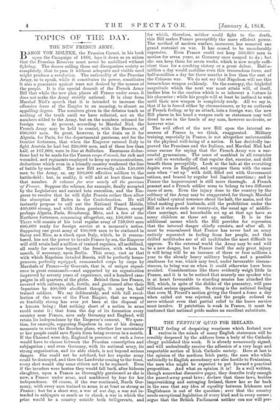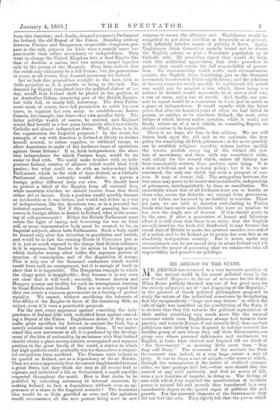THE TERTIUM QUID FOR IRELAND. T HAT feeling of despairing weariness
which Ireland now excites in the minds of many English statesmen will be sensibly deepened by the address from a body of the Catholic clergy published this week. It is already numerously signed, and will undoubtedly receive the adhesion of a very large and respectable section of Irish Catholic society. Here at last is the opinion of the medium Irish party, the men who while unfriendly to English ascendancy are also hostile to Fenianism, the men who might be expected to put forward a practical proposition. And what an opinion it is ! In a well written, though somewhat discursive paper, they describe truly enough the passed-away penal laws ; declare that these laws, besides impoverishing and outraging Ireland, threw her so far back in the race that any idea of equality between Irishmen and Englishmen is out of the question ; aver that the country needs exceptional legislation of every kind and in every corner ; argue that the British Parliament neither can nor will per-
form this function ; and, finally, demand a separate Parliament for Ireland, the old Repeal of the Union. Standing midway between Fenians and Orangemen, respectable clergymen pro- pose as the only panacea for Irish woes a remedy more im- practicable than either ascendancy or independence. They want to change the United Kingdom into a dual Empire like that of Austria, a nation into two nations bound together only by the person of the Monarch. They hint, indeed, that the result may ultimately be a full Union ; but, for generations to come, at all events, they demand autonomy for Ireland.
Let us look this proposition straight in the face, with as little prejudice as it is possible to bring to the task. The demand fog Repeal, translated into the political dialect of to- day, means that Ireland shall be placed in the position of an Australian Colony, remaining part of the British Empire, but with full, or nearly full, autonomy. The Irish Parlia- ment must, of course, have full permission to settle her own , taxes, to organize her own army, to establish—as Lower Canada, for example, has done—her own peculiar faith. The latter privilge would, of course, be exerted, and England would find herself in a few years intimately allied to a strictly Catholic and almost independent State. What, then, is to be the organization for Imperial purposes ? In the event, for example, of war with America, is Ireland at liberty to declare herself neutral, to refuse supplies, to withhold troops, to allow Americans to make of her harbours bases of operations against Great Britain ? If so, Irish independence, the abso- lute independence for which Fenians hope, would be far easier to deal with. We could make treaties with an inde- pendent Ireland, treaties of alliance which would bind both parties ; but what could we do with ail independent Irish Parliament, which in the nick of time desired, as a Catholic Parliament almost certainly would desire, to pursue a foreign policy different from cur own. We should have to protect a third of the Empire from all external foes, while uncertain whether we should receive from that third either aid or favour. Such a position would speedily become as intolerable as it was before, and would end either in a war of independence, like the American war, or in a peaceful but irritated separation. Yet if this right of pursuing her own course in foreign affairs is denied to Ireland, what is the mean- ing of self-government ? Either the British Parliament must retain the right of taxing and borrowing for war on Irish soil, or some representative body must be created to be, on Imperial subjects, above both Parliaments. Such a body could be framed only after due attention to population and wealth, and would be in fact the existing House of Commons just as it is, just as much exposed to the charge that British influence in it is supreme, but limited in its action to foreign policy, which includes among other trifles the supreme powers of taxation, of conscription, and of the disposition of troops. This is only one of the thousand confusions which would result from such an arrangement, but it is enough of itself to show that it is impossible. The Hungarian example to which the clergy point is inapplicable ; first, because it is not even yet clear that it will work ; secondly, because Austria and Hungary possess one facility for such an arrangement wanting to Great Britain and Ireland. They are so nearly equal that they can create a common government on a footing of perfect equality. We cannot, without sacrificing the interests of four-fifths of the Empire to those of the remaining fifth, an unjust, even if it were a practicable proposal.
For the rest, every argument against conceding the inde- pendence of Ireland tells with redoubled force against conced- ing a Repeal of the Union. Englishmen desire, if they are to make great sacrifices for Ireland, to content the Irish, but a merely colonial rank would not content them. If we under- stand this new movement at all, it is produced by the develop- ment of the idea of nationality, by an intense wish that Ireland should obtain a place among nations, a recognized and separate position in the great family of the world, a station in which her high qualities could gradually win for themselves a respect- ful recognition from mankind. The Fenians want Ireland to be quoted as Ireland, not as a dependency of Great Britain. They are aware apparently that she cannot singlehanded become a great State, but they think she may at all events lead as separate and individual a life as Switzerland, a small republic respected throughout the world. How is that desire to be gratified by conceding autonomy in internal concerns, by making Ireland, in fact, a dependency, without even an ap- pearance of a share in the Imperial councils V The dominant idea would be as little gratified as ever, and the agitation would recommence, all the new powers being used as new weapons to secure the ultimate end. Englishmen would be compelled to put down rebellion as frequently as at present, with infinitely inferior means of putting it down. Again, Englishmen think themselves morally bound not to desert the English colony, or give a Protestant population up to Catholic rule. By conceding repeal they would do both, with this additional aggravation, that while powerless to protect, they would retain the full responsibility of protec- tion. No statesmanship could, under such circumstances, restrain the English from interfering, just as the Germans incessantly interfered in Schleswig-Holstein ; and the relations of the two countries would speedily be embittered, till actual war could not be averted, a war which, there being two nations in Ireland, would necessarily be at once a civil war, a war of races, and a war of creeds. And, finally, our con- sent to repeal would be a concession to force just as much as a grant of independence. It would equally with the latter prove that after six hundred years of effort we had failed to govern, to subdue, or to conciliate Ireland, the most utter failure of which history makes mention, while it would not finally relieve us of a task which, in conceding Repeal, we should confess to be impossible.
There is no hope, we fear, in this address. We are still driven back upon the old and, as we maintain, the best policy for remedying all Irish grievances ; as far as we possibly can to establish religious equality, reform justice, modify the tenure, abolish every rag of the wicked old sys- tem of ascendancy, and then, with our consciences clear, wait calmly for the reward which, unless all history has been inaccurately written, time perforce must bring. It is a slow, a tedious, and an arduous policy ; but it is, we are convinced, the only one which has even a prospect of suc- cess. It may, of course, fail. The antagonism between the two races may prove to be innate and ineradicable, independent of grievances, inextinguishable by time or conciliation. We mournfully admit that of all Irishmen none are so hostile as those who, across the Atlantic, are exempt from grievances, pay no tithes, are harassed by no liability to eviction. There are men, we are told, in America contributing to Fenian funds who have never seen Ireland, who have no relation to her save the single one of descent. If this should prove to be the case, if after a generation of honest and laborious effort it is still clear that there is no unity, that the English are still invaders, the Irish still disaffected, it may become the moral duty of Britain to make the greatest sacrifice ever asked of a nation, and to let Ireland go to pursue her own fate as an absolutely independent country. But it never, under any circumstances, can be our moral duty to retain Ireland and yet surrender the power of governing what we retain—to take all responsibility and preserve no privilege.









































 Previous page
Previous page